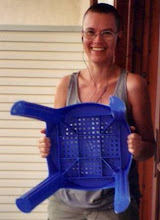Lost and Found
Given the subject of my earlier post on the politics and significance of Coming Out, I think some entries from my twenty-year-old diary should be allowed to stand alone. I'll begin with an early poem which is stepping out of the closet (the closed pages of a diary) for the very first time today.
September 6th 1986
I Did Not Want to Lose You
"I did not want to lose you."
Said a thousand times in a lifetime
to a thousand different lives.
All of them lost.
No longer mine, nor were they ever;
free to walk out and slam the door in my face.
But memories don't fade.
Occasionally the door moves ajar,
the movement of a silent puff of wind –
or is it my sigh?
And I see them standing there
in a crowd of faces of which I know none.
Moved on to a new playground
as mine has rusted over with tears.
Lost from touch, but touchingly stored,
because I did not want to lose you.
September 8th 1986
Oh, I'm so glad to be back at College. I am so happy in having seen R and in spending nearly all of the day in her company. I am incredibly happy, lively and interested when in her company. I love her; how I love her. We are good friends and nothing more, but I love just being with her, talking to her, laughing with her. She means a great deal to me. When at College there isn't so much time in which to worry and get depressed - and this is good for me. I don't have to sit and worry about what a problem being a lesbian can be, although some of my fears are lived out at College.
Sitting in the Common Room at dinner-time, all the other girls can do is sit and eye up the new first-year boys and talk really suggestively to each other about the males they sight. That's all they did today - any new male that appeared they rushed to stare at him in order to rate his dress sense and looks and to discuss how good he would be in bed. Of course I don't play a part in this conversation - I just laugh at their behaviour and refuse to mind that I play no part - but, it is quite upsetting, I must admit. It does make you realise that you're different - it's not other people who make you an outsider, it's your own thoughts. I get no enjoyment from oggling the boys. There's no point in forcing myself - I refuse to live out a pretence.
It's true what one woman said on the lesbian programme I watched - nearly all the conversation of friends is to do with some aspect of sexuality - but homosexuality is different - rather a taboo subject. It is okay to talk for hours and hours about boy/girl relationships but I am forced to keep silent about my sexuality.
R doesn't come into the Common Room. I rather wish that she did because I would sit with her, and I wouldn't mind what she did or said. It wouldn't bother me because I love her and I know I have her friendship. Love does make a great deal of difference - it is extremely important - and so very, very strong.
I was standing close to R at one point today and as she moved her breasts rubbed against my arm. I was very aware of this fact, and my thought at the time was: does she know she's doing this? I nearly allowed myself to believe that she had rubbed against me purposely because she stayed close for quite a number of seconds and made no movement to change position. I suppose, though, that she didn't notice or thought nothing of this happening because she has no thought of me sexually - whereas I am obviously going to be extremely aware of her and her body. It's sad, really, to think of the frustrations between people and the secrets that they keep.
I had thought that I might be afraid to touch R because of how I feel about her, but I am so glad that this is not the case. I have no anxiety, no nerves in touching her impulsively in order to capture her attention. This fact is a great relief to me because it shows that I act naturally with her - something which I must do. And, oh how naturally do I act! - I am so comfortable with R, so much at ease - so much in need of her being with me.
Labels: coming out, poetry



